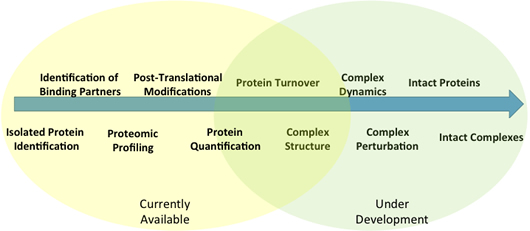Instrumentation & Services
Instrumentation
Thermo Orbitrap Fusion Tribrid Mass Spectrometer with EASY-nLC 1000 Liquid Chromatography System
The Thermo Orbitrap Fusion mass spectrometer combines its three mass analyzers -quadrupole, Orbitrap and linear ion trap in a Tribrid architecture that provides unprecedented depth of analysis for complex biological samples. It can perform a wide variety of analyses, from characterization of complex PTMs as well as comprehensive qualitative and quantitative analysis. Multiple fragmentation techniques (CID, HCD, and ETD)with fragment ion detection in either the ion trap or Orbitrap mass analyzer are available.
Thermo Q-Exactive Quadrupole-Orbitrap Mass Spectrometer with EASY-nLC 1000 Liquid Chromatography System
The Thermo Q-Exactive mass spectrometer combines quadrupole precursor selection with high-resolution, accurate-mass Orbitrap detection. It generates high quality MS and MS/MS data. Its advanced quadrupole technology improves quantitation of low-abundance ions in complex matrices.
Thermo TSQ Quantiva Triple Quadrupole Mass Spectrometer with UltiMate 3000 Rapid Separation LC System
The TSQ Quantiva triple quadrupole mass spectrometer employs Active Ion Management (AIM) to optimize ion creation and transmission from the source to the detector, resulting in extreme sensitivity. This enhanced level of sensitivity greatly improves results in applications such as high-throughput targeted MS experiments and targeted quantitation of small molecules.
Thermo LTQ-Orbitrap XL
This hybrid instrument consists of a linear ion trap and an electrostatic Fourier transform analyzer and is equipped with a nano-spray source. The instrument affords high sensitivity, in the low femtomole range for peptides, and mass accuracies in the single ppm range. The instrument is used for proteomic analysis of proteins either separated by gel electrophoresis or by two-dimensional chromatography (MudPIT). Precursor masses are determined in the high resolution Orbitrap with <10ppm accuracy. Fragmentation is achieved by collisional or higher energy dissociation (CID or HCD). In addition to proteomic analyses, the instrument is capable of analyzing small intact proteins to obtain accurate masses.
User Meetings
Services
Proteomics Sample Submission
Collaborators submitting samples for the first time should schedule a meeting with the Core Directors to discuss the project. The Mass Spectrometry Facility is able to perform many types of experiments and can tailor methods to your specific goals. Our core is closely aligned with the lab of John R. Yates III of The Scripps Research Institute and we can make newly developed technologies available to the Salk Community.

Our Proteomic Toolkit can be used to address a wide range of biological questions.
Let’s meet and find solutions for you!
